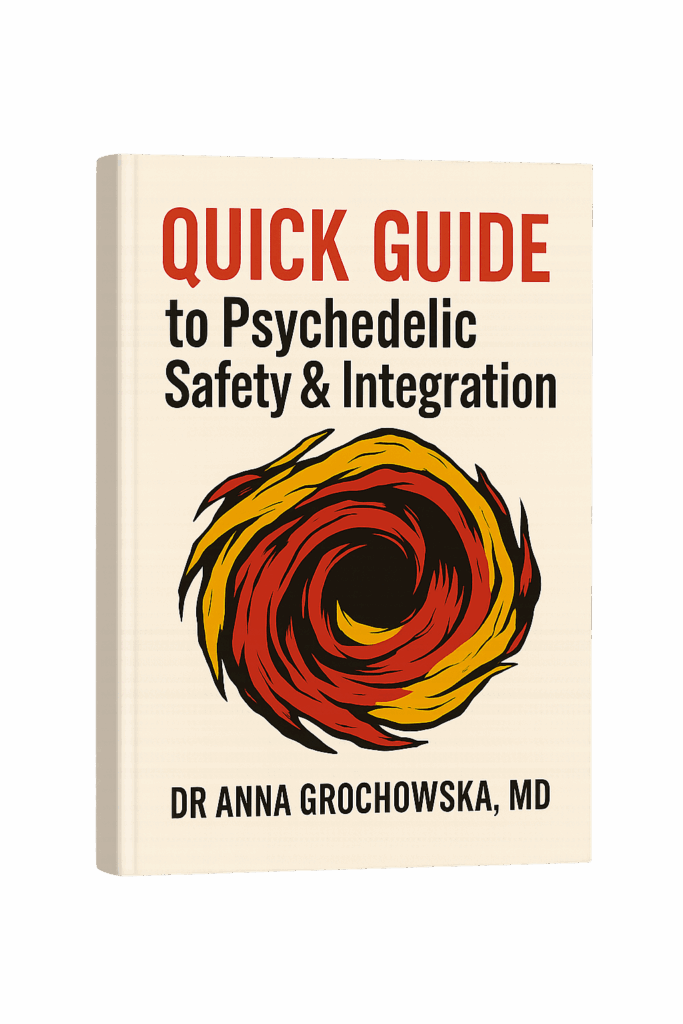Integrating Science and Therapy

Your mental health is the most important investment you’ll ever make.
Don’t wait - it’s worth all the effort!Dr Anna Grochowska, MD
Medical doctor
specializing in psychiatry and leading clinical trials
Psychologist
committed to personalized treatment and empathetic understanding
Clinical researcher
evidence-based studies and scientific publications

Dr Anna Grochowska, MD
My Work
I graduated in both Medicine and Psychology with a specialization in Psychotherapy.
Currently, I work at a hospital and my research focuses on psychedelic-assisted therapy as an innovative clinical approach to improving therapeutic outcomes and reducing psychiatric symptoms. I participated in clinical studies on psilocybin-assisted therapy at King’s College London, UK, and now I lead clinical investigation on 5-MeO-DMT.
In my private practice, I use hypnotherapy, for which I was trained and certified at the Milton H. Erickson Foundation in Phoenix, Arizona, USA.
My interests reflect exploring states of consciousness as tools for psychological healing and transformation.
PSYCHEDELIC ASSISTED THERAPY
What Psychedelic-Assisted Therapy Is?
Psychedelic-assisted therapy combines psychological support with the administration of a psychedelic substance in a safe and controlled setting.
This approach helps patients reach deep emotional insight, release trauma, and reconnect with their authentic self. When guided by trained professionals, it can accelerate the healing process by temporarily expanding one’s perception and allowing for a different perspective on past experiences.
In clinical settings, sessions are conducted under medical supervision, with psychological preparation and integration being essential parts of the process. It is not about the substance itself — but about what it allows to emerge and how that experience is processed afterwards.
How the Process Usually Looks:
In a research or clinical context, the process typically includes:
- Preparation phase: establishing trust, discussing intentions, and defining therapeutic goals
- Dosing session: the guided experience under professional supervision, focused on safety and inner exploration.
- Integration phase: talking through and reflecting on the insights gained during the session, to translate them into meaningful, lasting change.
I see psychedelic-assisted therapy as a powerful catalyst - not a shortcut, but a way to deepen and accelerate the therapeutic process.
W swojej pracy staram się używać wielu narzędzi, ze szczególnym zaznaczeniem HIPNOTERAPII.
You can read more about psychedelic-assisted therapy, its mechanisms, and its transformative potential in my upcoming book, where I share both scientific insights and clinical reflections from my research and practice.
It IS possible to live a life where what you do and feel each day aligns with your true self, brings satisfaction, and gives you a sense of purpose and peace. But that journey requires your own engagement and readiness to transform.
HYPNOTHERAPY
“Hypnosis is the oldest Western form of psychotherapy, but it has been tarnished by the image of swinging watches and purple capes.” – David Spiegel
Hypnotherapy should be understood as a catalyst for change, serving as an integral part of a broader therapeutic process.
Through hypnosis, it is possible to activate the innate self-healing potential within every person, guided by their individual needs. It opens the door to profound transformation.
By inducing:
- a high level of concentration, and
- a deep state of relaxation
the therapist first guides the client into a hypnotic state, and then works toward the therapeutic or developmental goal established together beforehand.
In hypnosis, one can let go of control, gain greater access to subconscious material, and experience shifts in perception and self-understanding. Hidden traumas and limiting beliefs can be released, allowing for meaningful psychological change.
Through the use of positive suggestions, hypnosis supports the formation of healthy habits, the reduction of trauma, and the deepening of personal growth and self-awareness.
Hypnosis, as part of psychotherapy, is truly remarkable. It amazes me. It has a unique and transformative power.
Hypnotherapy is an effective tool in the treatment of:
- anxiety and psychosomatic disorders
- various forms of addiction
- sleep disturbances
- and other psychological difficulties
Explore my works

Newest book
Now on sale!
Quick Guide to Psychedelic Safety & Integration by Dr Anna Grochowska delivers science-backed essentials for explorers: covering set & setting, intention, harm reduction, and integration. Practical checklists help you stay safe, learn, and create lasting change.